Spain approves pioneering child protection law
The legislation, which was championed by British pianist James Rhodes, extends the statute of limitations for crimes against children and paves the way for a paradigm shift on the rights of minors

Spain’s lower house of parliament, the Congress of Deputies, approved on Thursday a pioneering new law aimed at protecting children and adolescents against violence. The legislation was voted through with an absolute majority – a far from a common outcome in the current divisive political climate – with 268 votes in favor, 57 against and 16 abstentions.
The new legislation is known as the “Rhodes law” in recognition of campaigning by British concert pianist James Rhodes in defense of children’s rights. The British pianist, a Madrid resident who suffered sexual abuse when he was a boy, has been one of the most public faces pushing for a law to combat violence suffered by youngsters and adolescents.
We could become a benchmark for the worldLucía Muñoz, Unidas Podemos lawmaker
The law must now be passed in the Senate, where more amendments are likely to be presented. Given its urgency, however, the legislation may be published in the Official State Gazette (BOE) as early as June.
Children and adolescents make up nearly half of all sexual abuse victims in Spain, and more than 40,000 offenses against children were recorded in 2019, according to data from the Interior Ministry based on police reports. But the data is grossly incomplete. The figures only reflect the crimes that are reported, but many cases are never brought to the police.
The goal of the new law is to spark a paradigm shift in how the defense of children’s rights is understood, just as the gender violence law also helped change attitudes on violence against women. It guarantees the rights of children and adolescents against all forms of violence, from physical and sexual violence to online harassment, and includes measures to raise awareness of violence against children, and to detect, protect and compensate victims.
The law also aims to end the impunity of serious crimes against children, such as pedophilia, by extending the statute of limitations. Under the current law, the statute of limitations for sexual crimes against children is counted from the moment the victim becomes an adult. Under the new legislation, it will be counted when the victim turns 35. This means that crimes can still be prosecuted when the victim is at least 40 years old and up to 55 for the most serious cases. Experts note that this is an essential step because adults who have been abused as children often take a long time realizing what happened due to memory repression.

The new legislation places Spain at the forefront of the defense of children’s rights. It establishes measures to prevent the double victimization that occurs during the judicial process when the victim is forced to relive their trauma. It strengthens the right of youngsters to be informed and listened to. It gives the government a mandate to create specialized courts on violence against children. And it puts in place a raft of initiatives aimed at prevention, such as training for professionals who work with children and the establishment of protocols for schools, sports centers and children’s facilities.
The Spanish government – which is led by a coalition by the Socialist Party (PSOE) and junior partner Unidas Podemos – said the law marked a before and after in the defense of children’s rights. “We could become a benchmark for the world,” said Lucía Muñoz, from Unidas Podemos, on Thursday.
There were, however, some differences within the coalition government. Unidas Podemos proposed two amendments to the law – one to ban minors from attending bullfights and another aimed at guaranteeing the rights of children faced with eviction – but the PSOE voted against both of them. The former on the grounds that such powers belonged to the regions and the latter because the issue is currently being discussed as part of the negotiations on a new housing law.
Campaign for change
Child defense organizations have been demanding legal reform to protect minors for years. In 2010, the Committee for the Rights of the Child recommended Spain approve a law to protect children and in 2017, Congress voted in favor of a non-binding resolution on the urgency of a new law on children’s rights. Despite this, it took four years for the law to come to pass.
The child protection law is the first legislative measure from the Social Rights Ministry, which is headed by Ione Belarra, from Unidas Podemos. Speaking to Congress, Belarra, who took over from Pablo Iglesias when he resigned to run as a candidate in the Madrid regional election, explained the law “had high consensus, but low intensity.”
The minister also criticized the Spanish Catholic Church for its “complicity” in covering up sexual crimes against children, and made a direct address to the victims of child abuse. “If someone tries to make you feel to blame for what has happened to you, I want you to listen closely to my words: nothing that has happened to you is your fault. Ask for help because someone is going to help you,” she said.
Opposition
Only the far-right Vox party and the Basque Nationalist Party (PNV) voted against the child protection law. In the case of the PNV, the party opposed the bill on the grounds that it overstepped the separation of powers between the central government and regional authorities.
Vox lawmaker Teresa López, meanwhile, argued that the government had created the law to “clean their consciences” over its support for women’s reproductive rights. “Protecting childhood is not promoting abortion. That is violence,” she said.
English version by Melissa Kitson.
Tu suscripción se está usando en otro dispositivo
¿Quieres añadir otro usuario a tu suscripción?
Si continúas leyendo en este dispositivo, no se podrá leer en el otro.
FlechaTu suscripción se está usando en otro dispositivo y solo puedes acceder a EL PAÍS desde un dispositivo a la vez.
Si quieres compartir tu cuenta, cambia tu suscripción a la modalidad Premium, así podrás añadir otro usuario. Cada uno accederá con su propia cuenta de email, lo que os permitirá personalizar vuestra experiencia en EL PAÍS.
¿Tienes una suscripción de empresa? Accede aquí para contratar más cuentas.
En el caso de no saber quién está usando tu cuenta, te recomendamos cambiar tu contraseña aquí.
Si decides continuar compartiendo tu cuenta, este mensaje se mostrará en tu dispositivo y en el de la otra persona que está usando tu cuenta de forma indefinida, afectando a tu experiencia de lectura. Puedes consultar aquí los términos y condiciones de la suscripción digital.








































